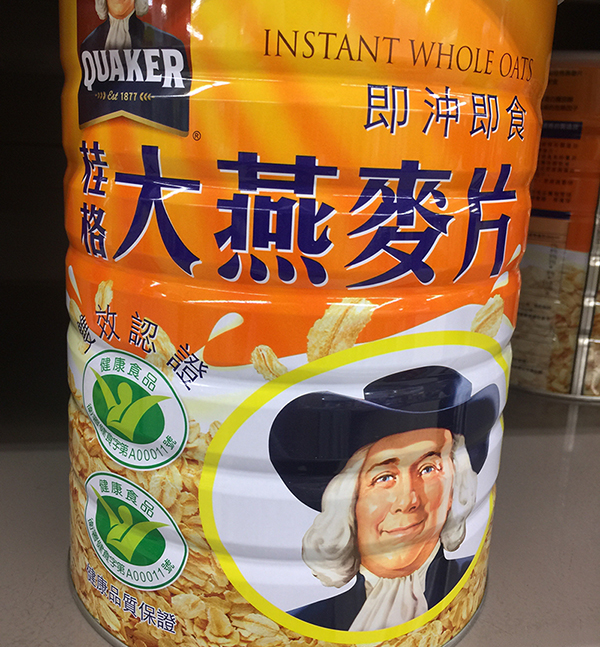UN INT Intro Text w/ Centered Large Responsive Image - *Important Note* You must UNLINK this shared library component before making page-specific customizations.
First, the good news!
After discussions with PETA, Taiwan-based company Standard Foods Corp.—the largest Taiwan health food company and licensee of PepsiCo’s Quaker Oats Company—became that nation’s first major food and beverage company to ban animal tests not required by law, which it conducted or funded to make human health claims for marketing its products.
In a groundbreaking decision, the company has adopted a new public policy stating that “Standard Foods Group while adapting to international scientific and animal welfare trends will not conduct, sponsor, or entrust/outsource to third-parties to conduct animal testing unless expressly required by regulations. You can read more about this victory here.

Also following talks with PETA, these companies enacted similar policies to end such animal testing, which they had previously pursued:
- Uni-President Enterprises Corporation (Asia’s largest food company)
- Swire Coca-Cola Taiwan (a leading soft drink maker and bottling partner of The Coca-Cola Company)
- Yakult Co. Ltd. (known for its probiotic drinks in Asia)
- Vitalon Foods Group (Taiwan’s third-largest health food company)
- Lian Hwa Foods Corporation (well known for its snack foods and a major supplier to convenience store giant 7-Eleven in Taiwan)
- Grape King Bio (Taiwan’s largest biotechnology fermentation health food company, known for its popular energy drink there)
- AGV Products Corp. (a major Taiwanese company licensed by Nestlé)
- Microbio Co. (a health food manufacturer in Taiwan)
Now we need your help to pressure other major food and beverage companies in Taiwan to get with the program and end similar horrific experiments, which collectively have used more than 8000 animals over the past two decades.
In some of the tests that these companies conducted, funded, or otherwise contributed to—none of which are required by law—experimenters fed mice a common Chinese herbal-medicine blend and chicken essence, starved them for up to 24 hours, and dropped them into beakers filled with water to observe how long they struggled before they drowned or remained underwater for eight consecutive seconds. If the animals learned to float and conserve energy, experimenters would stir the water to force them to struggle. To speed up the drowning process, experimenters tied lead wires to the mice in order to make it harder for them to swim. (Watch the video below of the forced swim test, an experiment used for various junk-science purposes that is similar to what animals in Taiwan laboratories endure.)
These outliers are on the wrong side of history.
UN MIS Responsive YouTube Video - *Important Note* You must UNLINK this shared library component before making page-specific customizations.
The Taiwan Food and Drug Administration (TFDA)—after receiving scientific comments from PETA and thousands of our supporters’ pleas to end animal testing—recently made historic announcements that scores of vulnerable animals would no longer be drowned or electrocuted in order for companies there to make anti-fatigue health claims for food and beverages, and that the agency would also now prioritize internationally recognized, non-animal tests for assessing food safety. In addition to pushing for the TFDA to amend a draft regulation to disallow health food companies from mutilating rats in attempts to make joint protection health claims, PETA and its international affiliates are also leading a global trend against animal testing—having persuaded dozens of food and beverage companies to end, or commit to never starting, experiments on animals.
The seven companies in Taiwan that recently banned animal testing after hearing from PETA are positive examples that other companies there can follow by pursuing safe human studies instead of tormenting animals.
Please send polite e-mails to the companies below to urge them to stop experimenting on and killing animals for marketing food and beverage products. You can do so by copying and pasting this block of e-mail addresses in the “To” field of your e-mail:
[email protected], [email protected]; [email protected]; [email protected]; [email protected]
You’re welcome to use the following talking points, but putting them in your own words will be more effective:
- Please adopt a policy prohibiting the use of animals in laboratory experiments during which they’re tormented and killed in attempts to establish human health claims for marketing your food and/or beverage products.
- Dozens of major food and beverage companies around the world now have public policies against animal testing, including Uni-President Enterprises Corporation, Asia’s largest food company.
- Business as usual is no longer acceptable, and it’s time to modernize by putting an end to your company’s deadly animal testing. Then use the form below to make a similar request of other major health food companies in Taiwan.
Then use the form below to make a similar request of other major health food companies in Taiwan.